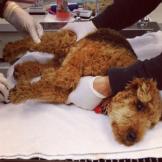 Image: Cardiff is restrained by Veterinary Cancer Group technicians for his last dose of Vincristine (the one that caused the reaction reported in Unexpected Side Effects of Chemotherapy Treatment)
Image: Cardiff is restrained by Veterinary Cancer Group technicians for his last dose of Vincristine (the one that caused the reaction reported in Unexpected Side Effects of Chemotherapy Treatment)
This article originally appeared on Dr. Mahaney’s The Daily Vet column on PetMD as When Pets Complete Chemotherapy Are They Cancer-Free?
It's been over six months since we began the long journey of Cardiff's cancer diagnosis and treatment, but the end has been reached and the outcome is ideal.
On June 25, 2014 Cardiff finished his course ofUniversity of Wisconsin-Madison Canine Lymphoma Protocol (CHOP) chemotherapy and had a repeat abdominal ultrasound, revealing no evidence of new masses nor any other concerning abnormalities inside his abdomen.
So, the milestone has been reached and it’s time to go back to our lives as normal ... so we hope.
Is Cardiff Cancer-Free?
Cardiff was technically in cancer remission after his exploratory abdominal surgery to remove the mass on his loop of small intestine in December 2013. Post-surgery, and on an ongoing basis, no further cancer cells could be detected as tissue samples collected from an abdominal lymph node, spleen, and liver all tested negative.
According to the National Cancer Institute (NCI), cancer remission means “a decrease in or disappearance of signs and symptoms of cancer. In partial remission, some, but not all, signs and symptoms of cancer have disappeared. In complete remission, all signs and symptoms of cancer have disappeared, although cancer still may be in the body.”
Although I could consider Cardiff’s cancer to be in remission, I still had to take additional steps to ensure a healthy and long life for him.
,
If Cardiff Was Considered in Cancer Remission Why Did He Get Chemotherapy?
The biopsy of surgically-removed intestinal mass revealed that Cardiff had T-cell lymphoma, which is a more severe diagnosis with a poorer prognosis as compared to B-cell lymphoma.
The recommendation from Cardiff’s veterinary oncologist (Dr. Mary Davis atVeterinary Cancer Group) was to put him through the course of CHOP to kill tumor cells waiting to become new masses.
My holistically-minded brain had hesitations about putting Cardiff through chemotherapy. On a seemingly never-ending loop, I asked myself, “If we surgically removed the cancer and strongly feel it's gone, do we really need to put a series of toxic injections or oral medication into his body?” Although we couldn’t detect them, cancer cells may still lurk in Cardiff’s abdomen and chemotherapy would prevent new tumors from forming.
I felt convinced that chemotherapy was the right thing to do, but I imparted my Chinese medicine and holistic perspectives via nutraceuticals and herbs to Cardiff’s treatment to help him better tolerate chemotherapy protocol.
On non-chemo days and excluding a few days post-chemotherapy, Cardiff received twice daily doses of:
- Rx Vitamins for Pets Nutrigest
- Pre- and probiotics — Probiotics are beneficial bacteria and pre-biotics are the materials on which probiotics grow.
- Digestive tract and immune system supporting ingredients — L-glutamine, Cat’s Claw, ginger, Oregon grape root, garlic, psyllium seed, aloe extract, etc.
- Rx Vitamins for Pets
- Glucamune — yeast-derived whole β-glucan particles [WGP], or
- Immuno Support — plant-derived Arabinogalactans, Shiitake Mushroom Extract [LEM], and Lutein [bioactive carotenoid])
- TCVM Herbal Wei Qi Booster teapills — In Chinese medicine, Wei Qi is the energy that protects the body from invading pathogens, irritants, and other undesirable stimuli. Wei Qi Booster is blend of Chinese herbs having anti-cancer, blood-moving, and energy-supporting effects. A teapill is a small, circular, black, “BB” like format that helps mask the herbal aroma and increase palatability with a slightly-sweet coating.
As Cardiff exhibited partial anorexia in being pickier about food and generally not eating with great zeal, these products were hand fed in small pockets of Trader Joe’s yogurt cheese, which is lower in lactose than regular-milk cheese, easy to mold around a pill or capsule, and greatly deters any detectable product aroma.
When Cardiff was eating more normally, he also benefitted from the anti-inflammatory effects of fish oil in the form of Nordic Naturals Omega-3 Pet. Since he now has a regularly improved appetite post-chemo, Cardiff will soon start on an oral chondroprotectant to benefit the mildly arthritic joints present in his toes and other body parts (after all, he’s a senior a nine years of age).
What Are the Next Steps in Monitoring Cardiff for Reemergence of Cancer?
Now the hard part is now over and the waiting game begins. Currently, the plan is for Cardiff to have an abdominal ultrasound every two months. Additionally, I perform blood testing every 7 to 14 days just to see if there are any subtle changes that could indicate his cancer is reemerging (alterations in white blood cells, globulins, albumins, T4, etc.).
Make sure to check out my Pet-Lebrity News column on Pet360 in early August, as we are having a ninth birthday/chemotherapy completion/cancer fundraiser party. It's likely going to be a star-studded event, so stay tuned to see photos and hear about Cardiff's good time for a good cause.

Dr. Patrick Mahaney
Copyright of this article (2014) is owned by Dr Patrick Mahaney, Veterinarian and Certified Veterinary Acupuncturist. Republishing any portion of this article must first be authorized by Dr Patrick Mahaney. Requests for republishing must be approved by Dr Patrick Mahaney and received in written format
